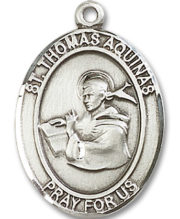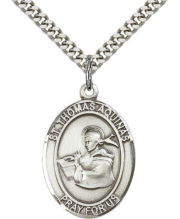$58.99 – $1,254.00
St. Thomas Aquinas Medal
- St. Thomas Aquinas is the patron saint of universities and students.
- St. Thomas Aquinas’s feast day is celebrated on January 28th.
This St. Thomas Aquinas medal has been proudly hand-made for over a century by Bliss’ team of artists in Rhode Island. The St. Thomas Aquinas medal is crafted to last a lifetime.
St. Thomas Aquinas Medal
This St. Thomas Aquinas Medal and Necklace features a pendant with a hand pressed image of St. Thomas Aquinas surrounded by the words ‘St. Thomas Aquinas Pray for Us’.
Sterling Silver St. Thomas Aquinas Medal and Necklace
14KT Gold Filled St. Thomas Aquinas Medal and Necklace
14KT Gold St Thomas Aquinas Medal
St. Thomas Aquinas
The 13th century was a time of extraordinary intellectual activity, which was not without its dangers. In their enthusiasm for learning, students flocked by thousands to the great Universities, which, were often schools of infidelity as of faith. The great philosophers of the time taught primarily based on the writings of Aristotle, and as Lacordaire said, “… unfortunately, Aristotle and the Gospel did not always agree”.
The Life of Saint Thomas Aquinas
It was amidst the confusion of these new opinions that St. Thomas Aquinas was born in the fortress of Rocca Secca, about the year 1225. It was to the little town of Aquino nearby that he owed his surname Aquinas. His father, the Count, was a nephew of Emperor Frederick Barbarossa; on his mother’s side he was descended from the Norman barons who had conquered Sicily two centuries before. The Aquinas family could claim relationship with St. Gregory the Great, and was closely related to St. Louis of France and St. Ferdinand of Castile.
The future vocation and sanctity of the little Thomas had been predicted to his mother, the Countess Theodora, by a holy hermit named Bonus. The first words spoken by baby Thomas were Ave Maria. When only five years old, he began school under the Monks of the celebrated Benedictine Abbey of Monte Cassino. Thomas made such progress in his studies that his parents sent him, when ten years old under the care of a tutor to the newly founded University of Naples. Here, his extraordinary talents became more and more manifest, whilst at the same time he made rapid strides in the studies of the lifves of the Saints.
Suffering for Christ
He was continually held up as a model to his fellow students in a way most painful to his humility. The rarest gifts of intellect were combined in him with the tenderest piety. His leisure hours were devoted to prayer and good works. At a young age St. Thomas Aquinas adapted the Christian faith much to the horror of his family who strove in every way possible to undermine their son’s resolution. He was even imprisoned for more than a year in one of the towers of the Castle, where he had to suffer cold, hunger, and every sort of deprivation.
Thomas’ constancy was put to a yet more terrible trial. His two young brothers brought an evil woman into his chamber, but with a flaming brand snatched from the hearth the Saint indignantly drove her from his presence. With the same brand he then traced a cross upon the wall Casting himself on his knees before it, he besought God to grant him the gift of perpetual chastity. As he prayed, he fell into an ecstasy, during which two angels appeared to him. Girding him with a miraculous cord, they said: “We are come from God to invest thee with the girdle of perpetual chastity. The Lord has heard thy prayer; and that which human frailty can never merit is insured to thee by the irrevocable gift of God”. The girdle was worn by the Saint until his death, and is still preserved at the Convent of Chieri in Piedmont.
It was only to his confessor, Brother Reginald, that he revealed this grace shortly before his death. Realizing that Thomas would not be overcome by persecution, some in his family helped him to escape, like St. Paul, by letting him down from the tower in a basket to the Friars, who, by appointment, were waiting below. They took Thomas to Naples, where he was immediately admitted to the University.
Joining St. Albert the Great
After years of studies, he became the disciple of St. Albert the Great. Astonished at the genius he displayed, St. Albert put the learning of his saintly disciple to a public test, and exclaimed before the assembled students: “We call Brother Thomas the dumb ox’; but I tell you he will one day make his bellowing heard to the uttermost parts of the earth”. In 1245 St. Albert took Brother Thomas as his companion to the General Chapter in Paris. While there he met a young Franciscan, St. Bonaventure, who was studying in that city. A bond of closest friendship sprang up between them.
After their three years of study, in 1248 both were raised to the degree of Bachelor of Theology. In November of that year Thomas returned to Cologne with St. Albert, where he taught philosophy and theology for four years. Soon after his return, the Saint was raised to the priesthood. His success as a lecturer and scholar was so great that the vast halls of the Convent of St. James were unable to accommodate the audience which desired to listen to his wisdom. He earned his Doctor’s degree in 1257.
A Doctor of the Church
The Church has always venerated his numerous writings as a record of sacred doctrine. In naming him the Angelic Doctor, the Church proclaimed that his science is more divine than human. On December 6, 1273, while saying Mass in his convent chapel in Naples he received a revelation that the end of his labors was near. Summoned by the Pope to attend the General Council convened at Lyons for the reunion of the Greek and Latin Churches, St. Thomas, though ill, accompanied by Brother Reginald and some other Friars, started on January 28, 1274, for Lyons.
On the way his condition grew worse. Not able to reach a Dominican convent, he was carried to the Cistercian Abbey of Fossa Nuova. Every attention was rendered him. His own brethren were in consolable at their approaching loss. One of them asked the Saint what was the best way of living without offending God. He replied: “Be certain that he who walks in the presence of God and is always ready to give Him an account of his actions, will never be separated from Him by sin”. These were his last words. Shortly after he fell into his agony and peacefully died on March 7 1274.
St. Thomas was canonized by Pope John XXI Avignon in 1323. In 1567, St. Pius V conferred on St. Thomas Aquinas the title of Doctor of the Church; whilst Pope Leo XIII by a Brief of August 4, 1880, instituted him Patron of all Catholic Universities, Academies, Colleges and Schools.
St. Thomas Aquinas Rosary
UPC: 617759831597
Brand: Bliss
| Metal Finishing | |
|---|---|
| Size |
Be the first to review “St. Thomas Aquinas Medal and Necklace” Cancel reply
You must be logged in to post a review.





Reviews
There are no reviews yet.